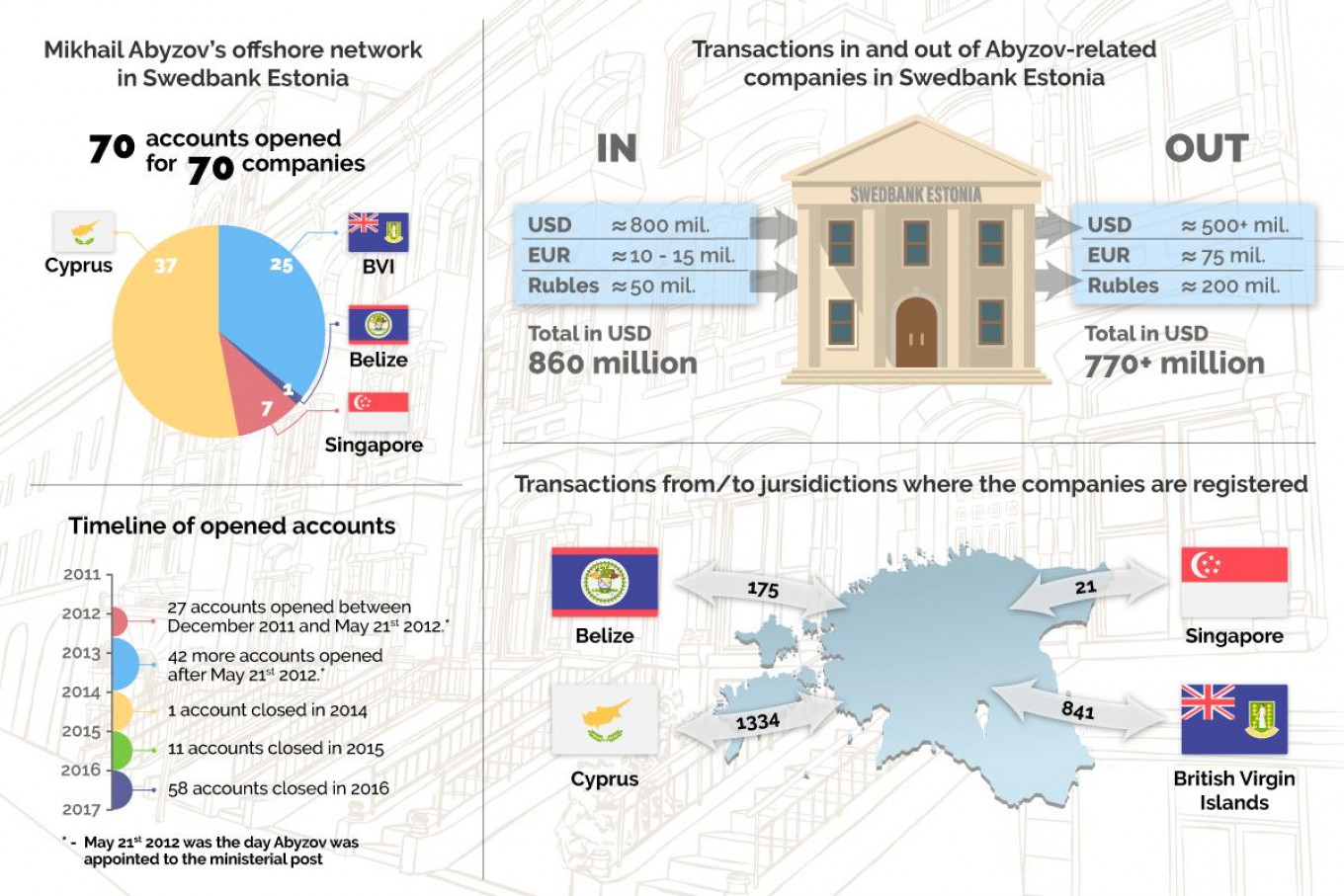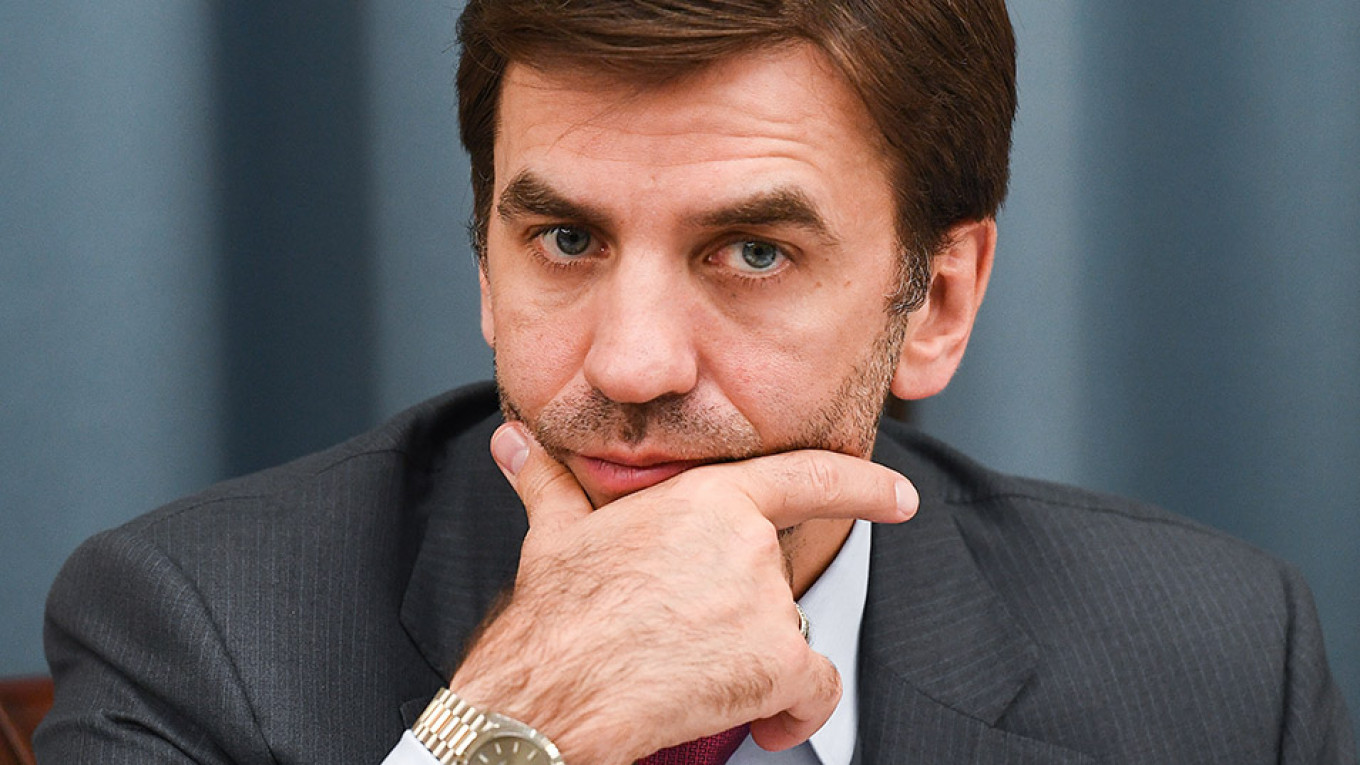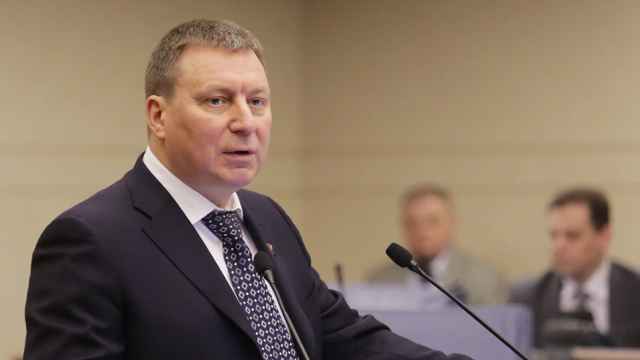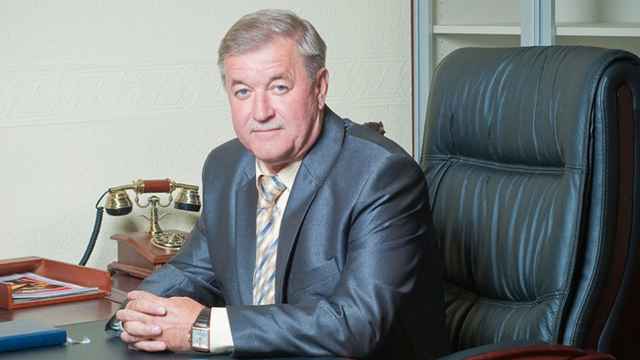Russian oligarch Mikhail Abyzov built a complex network of offshore companies that were used to move a fortune out of Russia, according to a Swedbank internal draft report obtained by OCCRP and its Swedish partner, national public TV channel Sveriges Television (SVT).
Today he’s charged with defrauding the Russian government and investors of US$60 million, money laundering, and running a criminal organization.
The web of 70 offshore companies in the British Virgin Islands, Cyprus, Singapore, and Belize had accounts in Swedbank Estonia, where a client manager once responsible for monitoring the transactions helped move suspicious funds, according to the internal report.
Some of the companies were used to transfer shares from energy deals while Abyzov was a government minister. Another was used to buy a luxury villa in Tuscany.
From 2011 to 2016, money going into Swedbank accounts of Abyzov-linked companies totaled around $860 million; $770 million flowed out.
Building an empire
Abyzov, 47, came of age in the ruins of the Soviet Union. He entered the prestigious Faculty of Mechanics and Mathematics at the Moscow State University in 1989, but left before earning a degree to devote himself to business, Russian press has reported. As a junior, he founded his first company, Intershops, to trade in Turkish consumer goods and office equipment.
In 1991, he earned more than $500,000 as a Russian commodity broker, according to the Russian-language news outlet Meduza. A year later, he and a classmate began importing brandy, cigarettes and the marinated, red-pepper spread known as lecho from Bulgaria. The company’s revenue reached several million dollars.
Soon, Abyzov moved on to the big money. In 1995, according to press reports, he founded ORTEK, a Russian fuel and energy company that quickly reached $100 million in revenue. When the Siberian region of Novosibirsk couldn’t cover its energy costs, Abyzov reportedly struck a deal with the regional governor in 1996, supplying fuel in exchange for a 19.5% stake in Novosibirskenergo, a company that controlled five thermal power plants. It is now named the Siberian Energy Company, or SIBEKO, and plays a central role in the current allegations against Abyzov.
Indeed, the Novosibirsk assets became the center of Abyzov’s fast-growing business empire and catapulted him onto the Forbes list of the wealthiest Russians. In 2012, at the peak of his business career, the magazine estimated his net worth at $1.3 billion. That same year, politics beckoned. Abyzov was appointed as Minister for Open Government Affairs in Dmitry Medvedev’s first cabinet.
An internal investigation of Swedbank’s Estonian subsidiary, obtained by OCCRP in collaboration with SVT, shows Abyzov started to move a vast number of his business accounts to Swedbank a little earlier, in 2011. Auditors identified 70 companies directly related to Abyzov.
A Norwegian anti-money laundering expert, Erling Grimstad, who wrote the report, faulted the bank for its handling of Abyzov and other high-risk, non-resident clients, referred to by the acronym HRNR.
Grimstad said a number of bank employees — including client managers, members of a committee tasked with handling high-risk customers, and the bank’s management team — failed to comply with basic “Know Your Client” principles and “protected some of the HRNR customers from the Russian authorities, including tax authorities.”
The employees hid the companies’ ultimate beneficial owners from the bank registration, a practice that “leads to risks of failure to identify sanctioned individuals,” Grimstad wrote.
The report itself has been a subject of dispute between the Swedish prosecutor’s office and Swedbank, one of Sweden’s largest banks. Until September the bank blocked authorities from interviewing Grimstad, claiming attorney-client privilege.
Skirting the law
More than half of the 70 companies linked to Abyzov once owned or continue to own shares in Russia’s energy, food, health resort and computer technology sectors. Some of the companies were operational while he was a government minister, violating Russian laws that bar state employees from conducting private business.
Abyzov was also required to declare any offshore companies where he was the beneficial owner. However, these declarations are not available to the public so it is unclear if he claimed the 70 foreign companies. Russia changed the law in 2017, banning offshore companies for government employees altogether.
Russian companies sometimes use offshore corporations to reduce tax liability, shield operations from public view, or take advantage of more predictable judicial systems in other countries, according to Ilia Shumanov, deputy director of Transparency International Russia.
“In this case, part of the offshore transactions could take place with the aim of withdrawing assets abroad, with the possibility of anonymous ownership and management of offshore structures by a public official,” Shumanov said.
“Mikhail Abyzov, holding the post of minister, did not have the right to engage in entrepreneurial activity in person or through proxies, including offshore companies,” said Shumanov. “Given the complex structure of his companies, it can be assumed that it was he who was behind the consolidation of all these assets in offshore jurisdictions, and that the initiative for key intra-corporate deals could come from him,” he added.
The Downfall
Abyzov’s fortune started to change in 2015.
First he got into a dispute with Alfa-Bank, one of Russian’s largest private commercial banks, regarding the debts of E4, his energy asset holding company, local media reported.
Then SIBEKO’s plan to raise electricity tariffs in Novosibirsk by 15% sparked seven mass protests in five months. Under pressure, the head of the Novosibirsk region reduced the tariff increase to 4%.
Finally, he and powerful Russian businessman Viktor Vekselberg, his partner in the energy company KES Holding, went to legal war with dueling lawsuits over a $500 million debt.
In March, Abyzov was accused of fraud and running a criminal organization, and arrested in Russia. Money-laundering charges followed, Russian press reported, citing his attorney. Blacksiris Trading Ltd., a Cypriot company linked to Abyzov and Swedbank Estonia, is at the center of the alleged criminal activity.
Russian investigators say Abyzov used Blacksiris to move 4 billion rubles, approximately $60 million, from SIBEKO and Regional Electric Networks (RES), which produces and transfers electricity in the Novosibirsk region, and where Abyzov was also the beneficial owner.
In announcing the charges, the Investigative Committee said that Abyzov, “acting in complicity with other persons,” fraudulently moved the $60 million out of SIBEKO and RES. “The stolen money is fully withdrawn abroad,” the committee concluded.
While a minister Abyzov also allegedly ordered the auction of shares of four energy companies, with a total value set at 156.1 million rubles ($2.4 million). Blacksiris won the auction, paying 186.3 million rubles ($2.9 million). Months later, Blacksiris merged the energy companies with four shell companies, and sold them to SIBEKO and RES for more than 20 times what it had paid.
The scheme victimized SIBEKO and RES minority shareholders, including a Russian state company, the committee said.
Another company on the Swedbank list, Batios Holding Ltd., is also under criminal investigation in Russia, the press reported last year. Batios was an investor in Alion Energy, a U.S. solar battery maker. Before becoming a government official, Abyzov was reportedly an Alion Energy board member, representing Batios.
In 2018, Russian authorities also arrested Abyzov’s former business partners, Mikhail Chuchkevich and Yan Ryazantsev, both members of the board of the state-owned Russian Venture Co. (RVC). According to the investigative committee, RVC invested 1.3 billion rubles ($22.7 million) in Alion Energy in 2012, even though the company was almost bankrupt. That money was later withdrawn, Russian press reported.
Inside help?
A total of $860 million went into the Swedbank accounts of Abyzov-related companies and roughly $770 million was taken out via more than 3,300 transactions. Auditors said Abyzov had to have help from a Swedbank insider.
A Swedbank Estonia client manager was found to be in possession of a PIN calculator, a device that generates codes for one of Abyzov’s companies. “The same pin calculator was used to transfer funds for one of the companies owned or controlled by Mr. Abyzov,” according to the bank’s internal report.
That employee, Aleksei Averson, left Swedbank in early 2017, after Abyzov’s accounts were closed by the bank. In April 2017, he became the director of Anduril Enterprises Ltd., a company registered in Cyprus and, according to the report, linked to Abyzov.
Questions about Averson were raised in a separate confidential bank report that reviewed the accounts of another high-risk, non-resident client.
“In discussing one transaction with a colleague, Averson said this transaction was ‘not the whitest of deals,’ using a colloquialism indicating that it was not transparent,” according to the report, which was sent to the bank’s top management.
In another communication, “Averson says to a colleague that one transaction received by an unspecified company was listed as being related to gas transportation services, and then left the same entity as ‘prepayment for stationary goods,’” according to the report.
Averson allegedly described the transaction as “a tall tale.’’ The Russian used in this context translates literally as “fairy tale.”
Averson declined interview requests, but in an email he expressed doubts about the existence of the reports. “I am fully convinced that the report authors, whoever they are, do not have any evidence for making these allegations, nor do they possess sufficient knowledge about, or care for applicable laws and regulations,” he wrote.

Averson added that he had “several potential job interviews” and accepted an offer from Anduril when it became clear in late 2016 that Swedbank was going to close out its business with non-resident customers.
“I was appointed one of two directors of Anduril Enterprises Ltd., a company having an Italian subsidiary, two months after I quit working for Swedbank,’’ he wrote in the email. “I served as one of two directors from April 2017 till July 2019, when I resigned and quit working for this group of companies.”
He insisted that he never made transactions using a clients’ PIN calculator: “This allegation is a lie and denied.”
Anduril Enterprises’ main asset is an Italian subsidiary, Villa Il Tesoro Societa’ Agricola. Il Tesoro translates from the Italian as ‘The Treasure’. The company’s principal activity is listed as grape and olive cultivation, with assets that include a luxury villa in Tuscany.
Anduril’s financial statements indicate that Il Tesoro was valued at 9 million euros in 2012 and at 20.6 million euros in 2016, the most recent year for which a statement is available.
In early 2017, during the height of the Novosibirsk energy tariff protests, Russian opposition politician Alexey Navalny released a video on YouTube of a drone flight over the property, showing that Il Tesoro is not some small farm. The sprawling compound features several large villas, a helipad, a tennis court, a golf course, an artificial lake, a large vineyard, fountains and a garage for about a dozen cars.

As with Abyzov’s energy companies, Anduril has changed ownership several times, with each new owner an offshore company that the Swedbank report identified as related to Abyzov. The most recent change was in April, following Abyzov’s arrest, when Anduril was acquired by Emmerson International Corp., a British Virgin Islands company.
Swedbank investigations
Grimstad’s draft report was presented to Swedbank on Dec. 10, 2018, and its first recommendation was that Estonian and Swedish authorities should be informed of the findings. However, the Estonian prosecutor’s office told OCCRP that as of November 2019 they have not received any notices from Swedbank.
Swedbank Estonia declined to comment, citing ongoing investigations in Estonia and Sweden.
Robert Kitt, who was recently fired from his position as CEO of Swedbank Estonia, said he first learned of the report from media coverage in March. “It is not a secret that I didn’t have it and therefore I couldn’t do anything in relation to the issues brought up in it,” Kitt told OCCRP.
Swedbank’s headquarters in Stockholm denied several of his requests for the report, according to Kitt. “That led me to conclude that if there had been anything significant in it, then according to the Estonian laws the council of the bank or the shareholders would have shared it with me,” he said.
In an interview with SVT, Swedbank Group CEO Jens Henriksson, who was hired in August, said he couldn’t comment on specific customers or employees. He added that claims raised by this investigation would be addressed in another, ongoing internal audit.
This investigation was published by OCCRP.
A Message from The Moscow Times:
Dear readers,
We are facing unprecedented challenges. Russia's Prosecutor General's Office has designated The Moscow Times as an "undesirable" organization, criminalizing our work and putting our staff at risk of prosecution. This follows our earlier unjust labeling as a "foreign agent."
These actions are direct attempts to silence independent journalism in Russia. The authorities claim our work "discredits the decisions of the Russian leadership." We see things differently: we strive to provide accurate, unbiased reporting on Russia.
We, the journalists of The Moscow Times, refuse to be silenced. But to continue our work, we need your help.
Your support, no matter how small, makes a world of difference. If you can, please support us monthly starting from just $2. It's quick to set up, and every contribution makes a significant impact.
By supporting The Moscow Times, you're defending open, independent journalism in the face of repression. Thank you for standing with us.
Remind me later.







